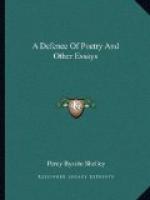But poets, or those who imagine and express this indestructible order, are not only the authors of language and of music, of the dance, and architecture, and statuary, and painting; they are the institutors of laws, and the founders of civil society, and the inventors of the arts of life, and the teachers, who draw into a certain propinquity with the beautiful and the true, that partial apprehension of the agencies of the invisible world which is called religion. Hence all original religions are allegorical, or susceptible of allegory, and, like Janus, have a double face of false and true. Poets, according to the circumstances of the age and nation in which they appeared, were called, in the earlier epochs of the world, legislators, or prophets: a poet essentially comprises and unites both these characters. For he not only beholds intensely the present as it is, and discovers those laws according to which present things ought to be ordered, but he beholds the future in the present, and his thoughts are the germs of the flower and the fruit of latest time. Not that I assert poets to be prophets in the gross sense of the word, or that they can foretell the form as surely as they foreknow the spirit of events: such is the pretence of superstition, which would make poetry an attribute of prophecy, rather than prophecy an attribute of poetry. A poet participates in the eternal, the infinite, and the one; as far as relates to his conceptions, time and place and number are not. The grammatical forms which express the moods of time, and the difference of persons, and the distinction of place, are convertible with respect to the highest poetry without injuring it as poetry; and the choruses of Aeschylus, and the book of Job, and Dante’s Paradise, would afford, more than any other writings, examples of this fact, if the limits of this essay did not forbid citation. The creations of sculpture, painting, and music, are illustrations still more decisive.




